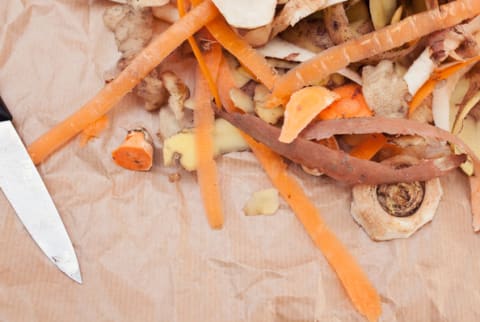Advertisement


If you live in Seattle, you'd better start paying closer attention to your trash. That is, of course, unless you have no shame. Wasting food will now earn you a red tag — much like a scarlet letter — on your garbage bin, which tells your neighbors that you've broken the new law.
Though the new policy, which aims to curb the amount of food sent to landfills, was instated January 1, Seattle just began enforcing it this month. Both residential and commercial property owners must either drive the waste to a processing site, have a composting service take it off their hands, or compost it themselves. Otherwise, they'll be dealt a fine in the form of public shaming. Any household with more than 10% food in its garbage gets a bright red tag.
The hope is that the tags will serve as a warning and an incentive to make composting more of a habit. The Seattle Public Utilities (SPU) estimates that the city sends approximately 100,000 tons of food waste 300 miles to a landfill in Eastern Oregon each year, resulting in higher costs and greenhouse gas emissions. The SPU projects that, with the new policy in place, 38,000 tons of food scraps will be saved from the landfill by being composted instead.
But this is only the first step in the city's campaign against wasting food. Come July, violators will begin facing fines: $1 per infraction for households and $50 per breach by apartment buildings and businesses. Its goal is to compost or recycle 60% of waste by the end of this year. Right now, it's at 56%.
The rest of the country seems to be lagging behind Seattle. Other cities like San Francisco, Portland, and New York mandate composting but don't penalize homeowners directly. According to the Environmental Protection Agency, food scraps make up 20% of our landfills — more than plastic, paper, metal, or glass.
But for a state whose government is so anti-waste, with some of the strictest recycling and composting laws, it's residents are still pretty slow to adapt.
"Right now, I'm tagging probably every fifth can," Rodney Watkins, a waste contractor in Seattle, told NPR. "I don't know if that's just the holidays, or the fact that I'm actually paying a lot more attention." And it's not like he has to comb through the trash; the forbidden items — commonly coffee grounds and orange peels — are typically in plain sight.
The city hopes that this is just due to a lack of awareness about the new policy. With the recent prevalence of the glaring tags, though, the infractions are certainly going to be harder to ignore.
Hopefully, Seattle's progress will motivate the rest of the country to be mindful of the waste it creates. Tags and fines may very well spread across the country, so we might as well be prepared for them. Think about how much we could cut down on greenhouse gases (and expenses, too!) if we followed in Seattle's smaller carbon footprints.